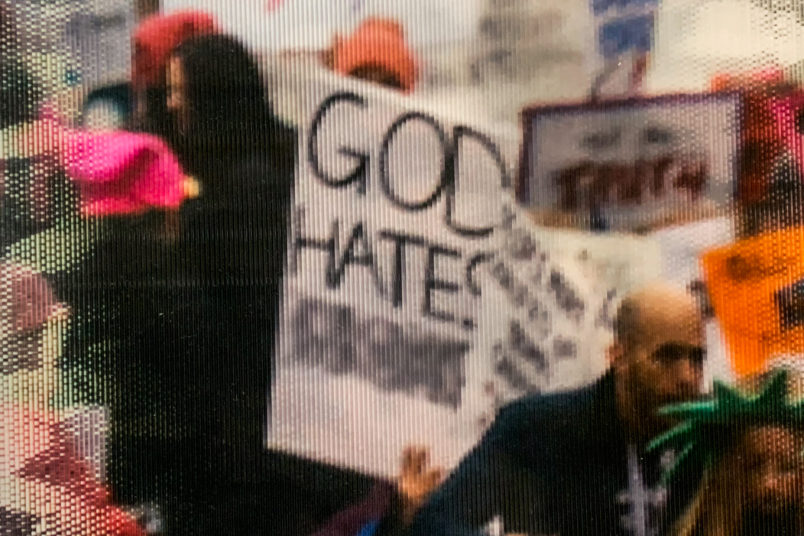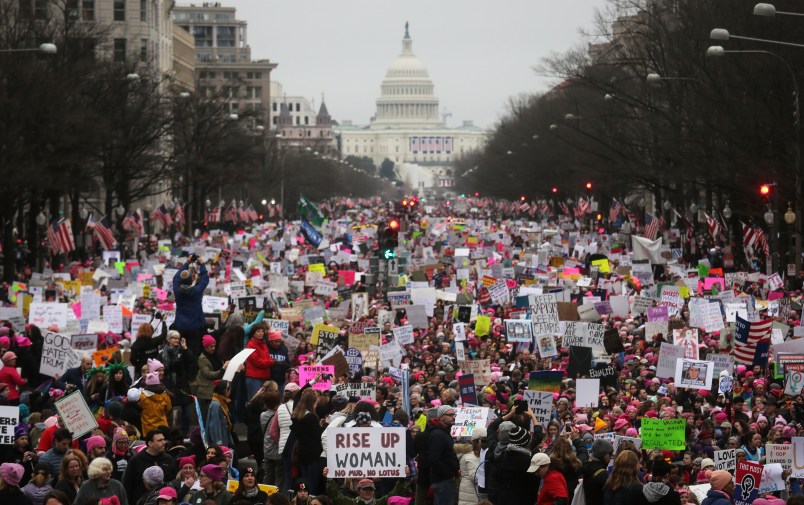The U.S. National Archives and Records Administration (NARA) apologized on Saturday for altering the photo seen above of the 2017 Women’s March to blur signs protesting against President Donald Trump.
“We made a mistake,” the federal agency said in a press release. “As the National Archives of the United States, we are and have always been completely committed to preserving our archival holdings, without alteration.”
NARA promised to remove the photo from the agency’s “Rightfully Hers: American Women and the Vote” exhibit, where the photo was displayed at the entrance, and replace it with the unaltered version. The agency also clarified that the edited photo was used merely as a “promotional graphic” and “is not an archival record held by the National Archives.”
“We apologize, and will immediately start a thorough review of our exhibit policies and procedures so that this does not happen again,” the agency said.
The altered image, first reported by the Washington Post, blurs out the word “Trump” and also words referencing women’s genitalia, such as “pussy,” on the protest signs. For example, a close-up of the edited photo shows that a sign that reads “GOD HATES TRUMP” was altered to read “GOD HATES” instead.

Prior to NARA’s apology, the agency had said in a statement on Friday that “as a non-partisan, non-political federal agency, we blurred references to the President’s name on some posters, so as not to engage in current political controversy.”
And mentions of women’s genitals were edited out because NARA considers its museum to be “family-friendly,” the agency said, and the words “could be perceived by some museum visitors as inappropriate.”
The edited photo “was an attempt on our part to keep the focus on the records” and was “part of a promotional display, not an artifact,” according to NARA.
“We do not alter images or documents that are displayed as artifacts in exhibitions,” the agency said.







Museum patrons, perhaps. But not conservative voters. They let you do it.
Thanks, GOP, for nominating a rabid dog to the presidency. I wouldn’t trust them to flush a toilet.
More deep state shenanigans.
This suggests that they would be fine putting out completely misleading “copies” of documents, without noting they are changed, so long as they have the complete unchanged original in their archives. That would be a complete abuse of the role of the Archive, Let’s hope this was a one-time thing by an over-anxious staff person.
Excuse me,
IT’S THE NATIONAL FUCKING ARCHIVE!
If it happened and is part of history and worth being archived,
THEN IS MUST BE AS IT OCCURED.
No editing - No Censorship - No fake history!
Have they removed photos of Klan members marching in DC from the 1930’s? Of course not.
No excuse is acceptable.
The Chief Archivist, David Ferriero, was appointed by Obama. I hate to see him step down because Trump would appoint someone awful. However, Ferriero needs to make amends to the world.
Good. It’s not actually an archive if you mess with the content for political considerations, is it?